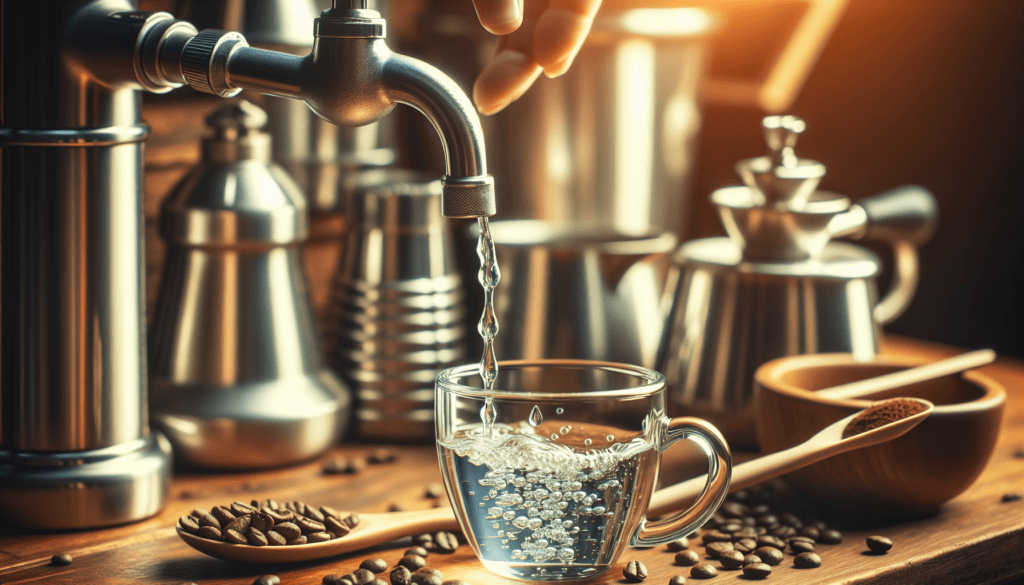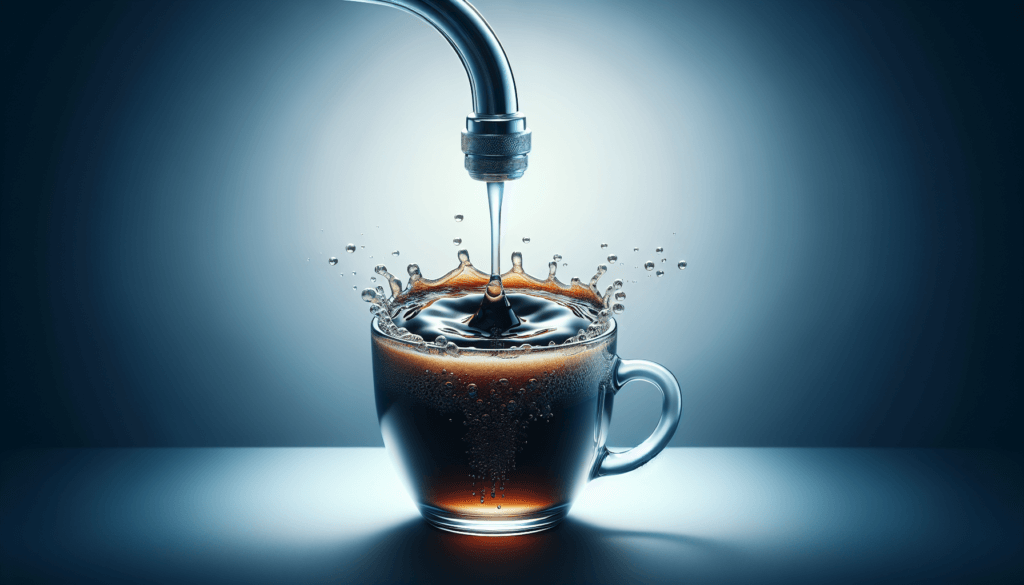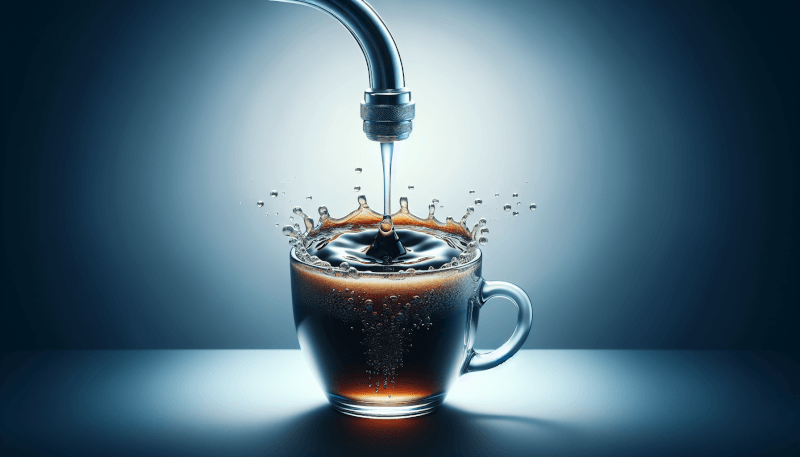Imagine starting your day with a perfectly brewed cup of coffee or tea. The rich aroma, the smooth taste – it’s pure bliss. But have you ever wondered what goes into making that perfect cup? It all comes down to the science of water quality. Yes, the humble H2O plays a crucial role in extracting the flavors from your beans or leaves, and understanding its impact can elevate your morning ritual to a whole new level. In this article, we will explore the fascinating world of water quality in brewing and unravel the secrets behind that heavenly sip. So grab your favorite mug and get ready to dive into the science of brewing the perfect cup!

Understanding Water for Brewing
Water is a crucial component in the brewing process, playing a significant role in the final quality and flavor of your beer. As a brewer, it is essential to have a comprehensive understanding of the importance of water, its chemical composition, and its role in the brewing process.
The Importance of Water in Brewing
Water makes up a significant portion of beer, with more than 90% of it being H2O. Its impact on the quality and taste of beer cannot be underestimated. Water affects various aspects of brewing, including flavor, aroma, color, clarity, and even the stability and shelf life of the final product. The characteristics of the water used in brewing can enhance or detract from the intended flavor profile of the beer.
Chemical Composition of Water
Understanding the chemical composition of water is crucial in brewing. The key elements of water chemistry include pH levels, mineral content, hardness, chlorine and chloramine levels, and temperature. Each of these factors contributes to the overall quality and suitability of water for brewing.
Role of Water in the Brewing Process
Water has several roles in the brewing process. It acts as a solvent, extracting essential compounds from the malt, such as sugars, proteins, and enzymes. Water also helps to control the pH level during mashing and brewing, which is critical for enzymatic activity. Additionally, it affects the hop utilization, as certain ions present in water can enhance or hinder the hop bitterness and aroma extraction.
Factors Affecting Water Quality
Understanding the factors that affect water quality is essential for brewers to make informed decisions about the water they use in their brewing process.
Source of Water
The source of water can significantly impact its quality for brewing. Different water sources, such as well water, tap water, or spring water, can have varying mineral compositions and pH levels. It is essential to consider the source of water to ensure it is suitable for brewing.
pH Levels
pH levels play a crucial role in the brewing process. The ideal pH range for brewing is typically between 5.2 and 5.6. pH levels below or above this range can affect enzyme activity, yeast performance, and overall beer quality. Monitoring and adjusting the pH levels of the brewing water is essential for achieving desired results.
Mineral Content
The mineral content of water, including ions such as calcium, magnesium, sodium, and sulfate, can have a profound impact on the flavor and character of the beer. Different beer styles require specific mineral profiles to achieve the desired taste and mouthfeel. Understanding and adjusting the mineral content of water accordingly is important for brewing different beer styles.
Hardness of Water
Water hardness refers to the concentration of minerals, primarily calcium and magnesium, in the water. Hard water can affect the flavor, clarity, and stability of beer. Determining the hardness of water and considering adjustments to achieve optimal hardness levels is crucial for consistent brewing.
Chlorine and Chloramines
Chlorine and chloramines are commonly found in tap water as disinfectants. These compounds can have a negative impact on the brewing process and result in off-flavors. Proper filtration and dechlorination methods are necessary to remove chlorine and chloramines from brewing water.
Temperature
Water temperature during mashing and brewing can impact the extraction of sugars, enzymes, and other compounds from the malt. The right temperature range is important for achieving desired efficiency and flavor in the brewing process.

Water Treatment Methods
To ensure the water used in brewing is of the highest quality, various treatment methods can be employed.
Filtration Systems
Filtration systems, such as activated carbon filters and sediment filters, are commonly used to remove impurities and particles from water. These systems can improve the taste and clarity of the water, providing a clean canvas for brewing.
Reverse Osmosis
Reverse osmosis (RO) is a water treatment method that removes nearly all minerals and impurities from water. RO systems are highly effective in producing high-quality brewing water with customizable mineral profiles.
Activated Carbon
Activated carbon filters can be used to remove chlorine, chloramines, and other organic compounds from water. These filters are commonly used in combination with other treatment methods to improve the overall quality of brewing water.
Water Softeners
Water softeners are used to remove excess minerals, primarily calcium and magnesium, from hard water. By reducing water hardness, softeners can help brewers achieve the desired mineral profile for specific beer styles.
Conditioning and Removal of Chlorine
Conditioning agents, such as sodium metabisulfite or potassium metabisulfite, can be used to remove chlorine from brewing water. These chemicals bind with the chlorine, making it inert and preventing its negative effects on beer flavor.
Dechlorination Chemicals
Dechlorination chemicals, such as activated carbon or carbon block filters, can also be used to remove chlorine and chloramines from brewing water. These chemicals neutralize the chlorine and ensure that the water is free from any off-flavors.
pH Adjustment
pH adjustment can be achieved using various methods, including the addition of brewing salts or acids to the water. These adjustments ensure that the pH level of the brewing water is within the optimal range for enzymatic activity and yeast performance.
Use of Different Minerals
The mineral content of brewing water can be adjusted by adding specific brewing salts or minerals. For example, calcium sulfate can be added to enhance hop bitterness, while calcium chloride can be used to enhance malt sweetness. Adjusting the mineral content allows brewers to tailor the water to specific beer styles.
Testing Water Quality
Testing the quality of brewing water is essential to ensure the desired results in the brewing process.
Importance of Testing Water for Brewing
Testing water quality is crucial to understanding its suitability for brewing different beer styles. By testing water, brewers can determine its mineral content, pH level, and any potential contaminants that may affect the final product.
Water Testing Kits
Water testing kits are readily available to brewers, allowing them to test the various parameters of their brewing water at home. These kits typically include tests for pH, chlorine, hardness, and mineral content.
Professional Analysis
For a more detailed and comprehensive analysis of brewing water, professional laboratories can provide accurate results. These analyses can help brewers understand the exact mineral composition of their water and make informed decisions regarding water treatment and adjustments.
Monitoring Water Quality
Regular monitoring of water quality is important to maintain consistency in brewing. By consistently testing water quality, brewers can ensure that their water meets the desired parameters for each beer style and make any necessary adjustments accordingly.

Impact of Water Quality on Brewing
Water quality has a significant impact on various aspects of the brewing process and the final product.
Flavor Profile of Water
The flavor profile of water can greatly influence the taste and character of the beer. Different mineral compositions can contribute to specific flavors, such as the bitterness of hops or the sweetness of malt. Understanding and adjusting the water’s flavor profile is crucial for producing beers that meet stylistic expectations.
Extraction Efficiency
Water plays a vital role in the extraction of sugars, proteins, enzymes, and other compounds from the malt. The mineral content and pH level of water can affect the efficiency of this extraction process. Ensuring the optimal mineral content and pH level of brewing water is essential for achieving consistent extraction efficiency.
Hops Utilization
The mineral composition and pH level of water can also affect the utilization of hops in brewing. Certain ions present in water can enhance or hinder the extraction of hop bitterness and aroma. Adjusting water chemistry to optimize hops utilization can greatly impact the balance and flavor of the beer.
pH and Enzyme Activity
Maintaining the optimal pH range during mashing and brewing is crucial for enzymatic activity. Different enzymes responsible for converting starches to sugars have specific pH requirements. If the pH level is not within the optimal range, enzyme activity may be hindered, leading to incomplete conversion and potential flavor issues in the final product.
Consistency in Brewing
Water quality plays a significant role in achieving consistency in brewing. By controlling the mineral content, pH level, and other relevant factors, brewers can replicate the desired flavor profiles and maintain consistency across different brewing batches.
Stability and Shelf Life
Water quality also influences the stability and shelf life of beer. Certain minerals, such as calcium, can contribute to beer clarity and stability, preventing haze formation and extending the beer’s shelf life. Understanding and managing water quality is essential for producing beers that maintain their quality over time.
Water Profiles for Different Beer Styles
Different beer styles require specific water profiles to achieve the desired characteristics and flavors.
Importance of Water Profiles
Water profiles are essential for replicating specific beer styles. The mineral content and pH levels of brewing water significantly impact the final flavor, aroma, and mouthfeel of the beer. Understanding the required water profiles for different beer styles allows brewers to create authentic representations of these styles.
Water Profiles for Pale Ales
Pale ales typically require water with a balanced mineral profile, leaning towards a higher carbonate concentration. This balances the bitterness of hops and enhances malt flavors. The pH level should be slightly alkaline to optimize enzyme activity during mashing.
Water Profiles for Stouts
Stouts benefit from water with a higher sulfite and chloride content. These minerals enhance the malt sweetness and contribute to the smoothness and fullness of the beer. The pH level should be slightly acidic to promote mash efficiency.
Water Profiles for Pilsners
Pilsners call for water with low mineral content, emphasizing a soft and delicate flavor profile. The mineral content should be low in sulfites and chlorides, allowing the hops to shine. The pH level should be slightly alkaline to promote enzymatic activity.
Water Profiles for IPAs
IPAs have distinct hop-forward flavors, requiring water with a balanced mineral profile to enhance hop bitterness and aroma. Sulfite and chloride levels should be moderate. The pH level should be slightly alkaline to promote enzymatic activity during mashing.
Regional Water Profiles
Regional water profiles have historically influenced the development of local beer styles. Famous beer styles, such as the Burton Ales of England or the Pilsners of Czech Republic, developed as a result of the specific mineral compositions present in their respective water sources. Understanding and replicating these regional water profiles can help brewers create authentic versions of these styles.

Adjusting Water to Style
To achieve the desired water profiles for different beer styles, water adjustments are often necessary.
Understanding Style-Specific Requirements
Understanding the specific mineral and pH requirements for each beer style allows brewers to make targeted adjustments to their water. By considering the desired flavor profile and characteristics of the beer style, brewers can adjust mineral content and pH levels accordingly.
Calculating Water Adjustments
Water adjustments can be calculated using various software programs, spreadsheets, or online calculators. These tools take into account the starting water profile and the desired adjustments, providing accurate calculations for mineral additions or dilutions.
Boiling and Dilution Methods
Boiling or diluting brewing water can be used to adjust mineral content and pH levels. Boiling water can help reduce temporary hardness caused by calcium and magnesium. Dilution can be used to reduce mineral content or adjust pH levels to desired ranges.
Role of Water in Specialty Brews
Water quality is crucial not only in beer brewing but also in the production of other specialty beverages.
Water for Espresso and Coffee Brewing
Water quality is essential for achieving optimal flavors in espresso and coffee brewing. The mineral content, pH level, and chloramine content can significantly impact the taste, aroma, and extraction of coffee compounds. Conditioning and filtering the water used in espresso and coffee brewing are vital for achieving the perfect cup.
Water for Tea Brewing
The mineral content and pH level of water can affect the extraction of flavors and compounds in tea brewing. Different types of tea require specific water profiles to achieve the desired taste and aroma. Understanding and adjusting water quality accordingly is essential for brewing the perfect cup of tea.
Water for Distilled Spirits
Water is a key ingredient in the production of distilled spirits, such as whiskey, vodka, and gin. The mineral content and pH level of water can significantly impact the fermentation, distillation, and aging processes of spirits. Using water of the highest quality, with specific mineral and pH profiles, ensures the desired flavors and characteristics in the final spirits.

Water Conservation in Brewing
Water conservation is a crucial consideration for brewers, as the brewing process can be water-intensive.
Importance of Water Conservation
Conserving water is not only environmentally responsible but also economically beneficial for brewers. By adopting water conservation practices, brewers can reduce their environmental impact and minimize water-related costs.
Recycling and Reusing Water
Recycling and reusing water within the brewing process can significantly reduce water consumption. Techniques such as capturing and reusing water from the wort cooling process or from fermentation can conserve significant amounts of water.
Reducing Water Usage
Implementing water-efficient equipment and processes can help reduce water usage in brewing. Utilizing low-flow faucets, automated cleaning systems, and efficient heat exchangers can contribute to significant water savings.
Sustainable Water Practices
Adopting sustainable water practices, such as rainwater harvesting or wastewater treatment, can further reduce the environmental impact of brewing. These practices can provide alternative water sources or treat and reuse wastewater for non-brewing purposes, minimizing overall water consumption.
Conclusion
Understanding the science behind water quality in brewing is essential for producing the perfect cup of beer. From the chemical composition of water to the importance of water profiles for different styles, each aspect plays a crucial role in the final product. By paying attention to water quality, making necessary adjustments, and adopting sustainable practices, brewers can consistently create beers that meet stylistic expectations and delight beer enthusiasts worldwide. Continued research and innovation in the field of water quality and brewing will help brewers refine their craft and continue to push the boundaries of flavor and excellence.


